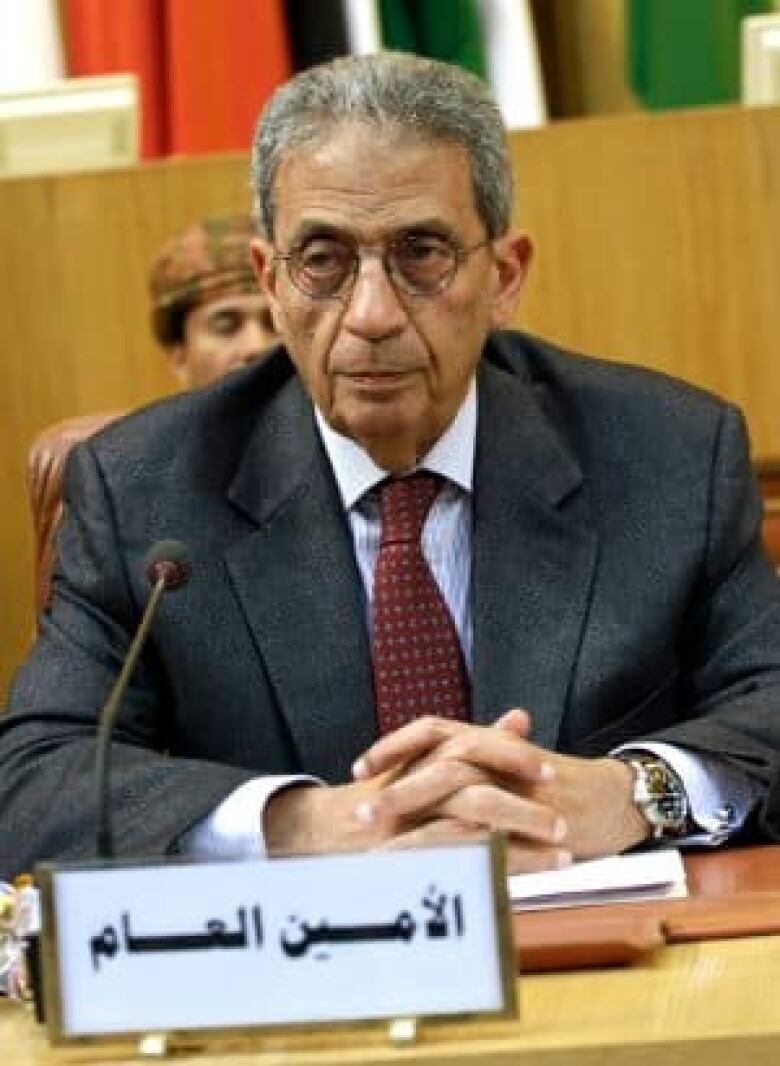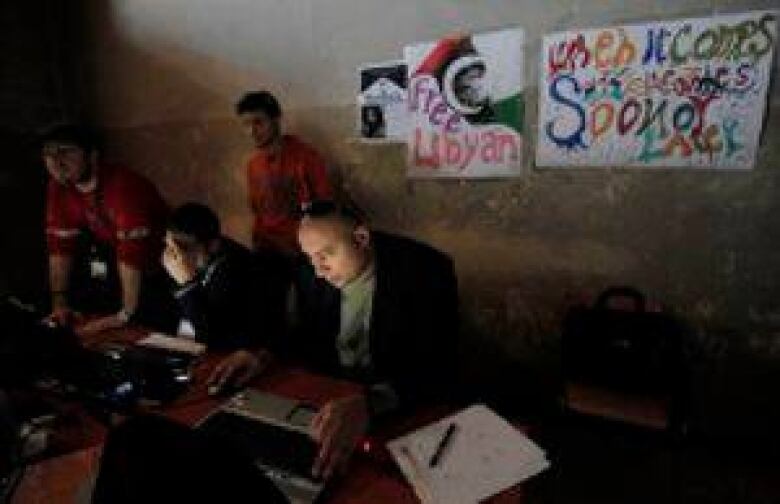Arab League backs no-fly zone over Libya
Al-Jazeera journalist killed in ambush, station says

TheArab League asked the UN Security Council Saturday to impose a no-fly zone over Libya to protect civilians from air attack by forces of Moammar Gadhafi's embattled government, giving crucial backing to a key demand of the rebel forces battling to oust the Libyan leader.
Foreign ministers from the 22-member Arab bloc, meeting in Cairo, also left the Libyan leader of more than 40 years increasingly isolated, declaring his government had "lost its sovereignty."
They also appeared to confer legitimacy on the rebel's interim government, the National Libyan Council, saying they would establish contacts with it and calling on nations to provide it with "urgent help."
"The Arab League asks the United Nations to shoulder its responsibility to impose a no-fly zone over the movement of Libyan military planes and to create safe zones in the places vulnerable to airstrikes," said a League statement released after the emergency session.
The unusually rapid and bold action for a bloc of nations known for lengthy and acrimonious deliberations appeared to reflect the shifting currents of a Middle East in tumult. Many other Arab governments are facing street protests and rumblings of dissent stirred by the uprisings in Tunisia and Egypt, and their leaders may have felt compelled to act in favour of Libya's rebellion.
'Grievous violations and serious crimes'

That stance appeared meant to win over the deeply Arab nationalist government of Syria, which has smarted against foreign intervention into Arab affairs.
The statement said the Arab League rejected "all kinds of foreign intervention" in Libya but warned that "not taking the necessary action to end the crisis will lead to intervention in Libya's foreign affairs."
The Arab League cannot impose a no-fly zone itself. But the approval of the key regional Arab body gives the U.S. and other Western powers crucial regional backing they say they need before doing so. Many were wary that Western powers would be seen as intervening in the affairs of an Arab country if they began a no-fly zone without Arab approval.
Still, the Obama administration has said a no-fly zone may have limited impact, and the international community is divided over the issue.
Moussa said the League would immediately inform the U.N. of its call.
Backing the rebel's political leadership, the League statement said it had faced "grievous violations and serious crimes by the Libyan authorities, which have lost their sovereignty."
It remained to be seen whether any Arab forces would participate in air patrols in support of a no-fly zone.
Journalist killed
The league statement came the same day that anAl-Jazeera cameraman was killed in an ambush near the eastern city of Benghazi, the first journalist slain in the nearly month-long conflict, the satellite station said.
Ali Hassan al-Jaber, a Qatari national, was killed and a correspondent was wounded and hospitalized in what the station described as an ambush on the crew as it returned from an assignment south of the rebel stronghold, which is deep inside opposition-held territory.

Amhadi said the crew's car came under fire from the rear. Al-Jaber was shot three times in the back and a fourth bullet hit the correspondent near the ear, he said.
"Even areas under rebel control are not totally safe," said Amhadi. "There are followers, eyes or fifth columns, for Col. Gadhafi."
General director Wadah Khanfar said on Al-Jazeera that "this attack came after an unprecedented incitement campaign by Gadhafi ... This incitement is the main reason for what happened."
A large protest was organized later in Benghazi in solidarity with the slain cameraman. Some banners read: "Targeting journalists reveals the criminal regime of the tyrant."
In a statement issued later by the station, a spokesman for the network accused the Libyan government of waging a campaign against its journalists.
"We condemn this deliberate act of violence, which comes as part of a targeted campaign aimed at our journalists and crews. Al-Jazeera's goal has been to report the unfolding events in Libya accurately and comprehensively," the statement said.
Pro-regime loyalists
Gadhafi has kept Western journalists under tight control, taking them to towns he has seized, and around the capital, Tripoli, under government escort to see squares filled with pro-regime loyalists.
Most of eastern Libya remains under rebel control, though pro-government forces have retaken territory in the past several days.
Rebels have given journalists far greater freedom but moving around the swiftly changing lines of control has been perilous.
The BBC has said three of its staff were detained, beaten and subjected to mock executions by pro-regime soldiers in Libya while attempting to reach the contested city Zawiya.
Chris Cobb-Smith, a British journalist and part of the crew, said the group was moved between several locations, in some cases alongside civilian captives who had visible injuries from heavy beatings.
Gadhafi's government freed a Brazilian reporter from detention after eight days but is still holding Ghaith Abdul-Ahad, an Iraqi national working for The Guardian.
Andrei Netto of the Estado de S. Paulo paper was released Thursday. He and Abdul-Ahad entered Libya through Tunisia and had filed news reports before being detained 10 days ago in the town of Sabratha.












_(720p).jpg)


 OFFICIAL HD MUSIC VIDEO.jpg)
.jpg)



























































































